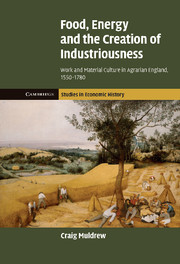 Food, Energy and the Creation of Industriousness
Food, Energy and the Creation of Industriousness Book contents
- Frontmatter
- Contents
- List of figures
- List of tables
- Preface
- Note on measurements and inflation
- List of abbreviations
- 1 Introduction
- 2 What did labourers eat?
- 3 Calories consumed by labourers
- 4 Labourers' household goods
- 5 Work and household earnings
- 6 Agricultural labour and the industrious revolution
- 7 ‘Honest’ and ‘industrious’ labourers?
- Conclusion
- Bibliography
- Index
- References
Bibliography
Published online by Cambridge University Press: 04 February 2011
- Frontmatter
- Contents
- List of figures
- List of tables
- Preface
- Note on measurements and inflation
- List of abbreviations
- 1 Introduction
- 2 What did labourers eat?
- 3 Calories consumed by labourers
- 4 Labourers' household goods
- 5 Work and household earnings
- 6 Agricultural labour and the industrious revolution
- 7 ‘Honest’ and ‘industrious’ labourers?
- Conclusion
- Bibliography
- Index
- References
- Type
- Chapter
- Information
- Food, Energy and the Creation of IndustriousnessWork and Material Culture in Agrarian England, 1550–1780, pp. 325 - 345Publisher: Cambridge University PressPrint publication year: 2011


